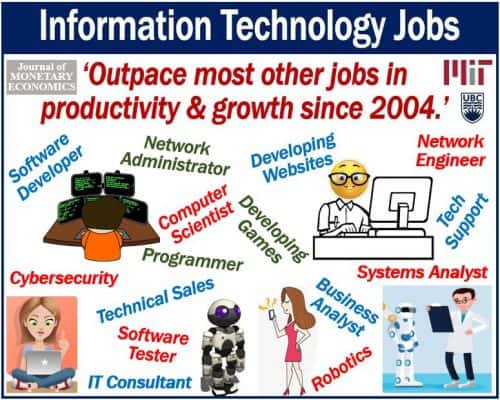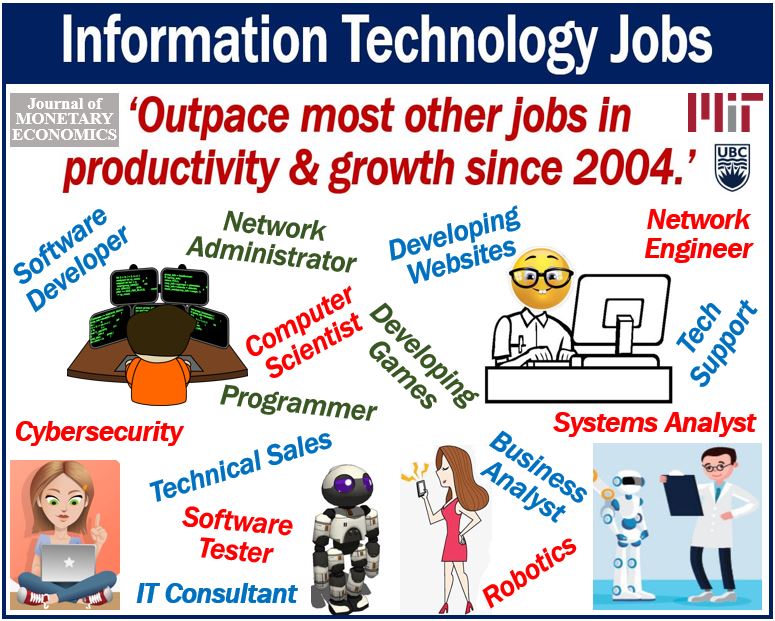Information technology jobs have outpaced most other jobs in growth and productivity since 2004, a new study found. Positions in cybersecurity, and big data, for example, are information technology jobs. These types of jobs are providing workers in the US with long-lasting financial stability.
Information technology or IT refers to the maintenance, use, and development of computer systems and their networks.
Giovanni Gallipoli and Christos Makridis wrote about their study and findings in the Journal of Monetary Economics (citation below). Prof. Gallipoli is Associate Professor from the Vancouver School of Economics at the University of British Columbia (UBC). Dr. Makridis Christos serves as a Digital Fellow at the MIT Sloan Initiative on the Digital Economy.
Prof. Gallipoli said:
“The future of jobs is in IT, and IT-intensive tasks. Growth and productivity in jobs involving IT tasks are very strong, and workers who can perform such tasks have a clear competitive advantage in the labor market.”
Records show that there has been a slowdown in employment associated with skills and education since the year 2000. There has also been a slowdown in wage gains in these jobs.

Information technology jobs
However, this slowdown is not happening for all IT employment, the researchers found. The share of information technology jobs has increased significantly over the last twenty years. Between 2004 and 2017, IT-intensive occupations have grown by 19.5%.
Less IT-intensive jobs grew by only 2.4% between 2004 and 2017.
Over the past decade, the number of information technology jobs has grown twice as fast as other jobs.
Information technology jobs – earnings
Regarding earnings in IT jobs compared to other jobs, Prof. Gallipoli said:
“While there is clear evidence that earnings growth for Americans with college degrees has somewhat flattened since 2000, earnings have actually grown significantly for individuals working in jobs involving IT tasks.”
“Both companies and workers stand to benefit if they invest in IT education.”
Information technology jobs in manufacturing
There has been a decline in traditional manufacturing employment from automation and off-shoring. The study also showed, however, that a subset of jobs in manufacturing has increased in number. Specifically, information technology jobs in the manufacturing sector. These IT jobs also have high productivity growth and returns.
Regarding companies with vacant information technology jobs, Dr. Makridis said:
“Companies often report troubles finding enough workers for IT-intensive tasks. This suggests the presence of a skills gap for jobs with digital and technical requirements. The insufficient number of job candidates able to perform complex IT tasks suggests the possibility of workers’ mismatches in the labor market.”
“It also suggests the need for additional training, whether formal or on the job, like apprenticeships, that focuses on the skills that are most in demand.”
Debate on automation and technology
Much of today’s debate regarding automation and the role of technology in employment focuses on their effect on employment. It focuses, for example, on how robots are replacing human workers.
However, the researchers say we need to focus more on their effects on wages and productivity. We also need to focus more on the ongoing structural change in the labor market. This applies to jobs both in manufacturing and services.
Automation is a technique, method, or system of operating or controlling a process by highly automatic means. In business, medicine, and science, for example, we use electronic devices such as computers, robots, and AI. AI stands for artificial intelligence.
Regarding certain IT-intensive tasks, Prof. Gallipoli says:
“Our research starts to highlight these sizable effects, and the growth in employment demand for certain IT-intensive tasks cannot be easily automated or *offshored.”
“The emergence of IT-intensive jobs has had a major impact on the structure and on the distribution of wages both within and across sectors.”
* To offshore offshoring, or offshore outsourcing means relocating part of a company’s operations abroad. A car company, for example, may offshore by moving one of its factories abroad.
Dr. Makridis made the following comment about information technology jobs and demand for IT workers:
“As the cost of collecting and processing information continues declining, every company is going to turn into a data science company, whether they like it or not. That is only going to raise the demand for information technology workers.”
Citation
“Structural transformation and the rise of information technology,” Giovanni Gallipoli and Christos A.Makridis. Journal of Monetary Economics, Volume 97, August 2018, Pages 91-110. https://doi.org/10.1016/j.jmoneco.2018.05.005.

